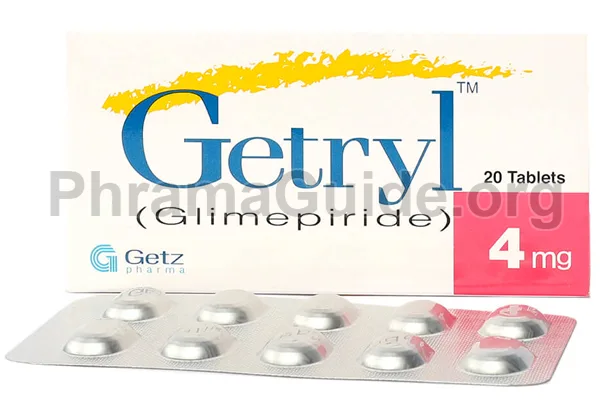Getryl is an oral medication commonly used to treat type 2 diabetes by helping to lower blood sugar levels. Like any medication, Getryl can cause side effects.
Common Side Effects
- Hypoglycemia (low blood sugar): This is the most common side effect of Getryl. Symptoms of hypoglycemia can include sweating, trembling, confusion, dizziness, rapid heartbeat, and headache. It is important to monitor your blood sugar levels regularly and be aware of the signs of low blood sugar.
- Weight gain: Some people may experience weight gain while taking Getryl. It is important to maintain a healthy diet and exercise to manage your weight.
- Gastrointestinal issues: Common gastrointestinal side effects of Getryl can include nausea, abdominal pain, and diarrhea.
- Skin reactions: Skin rashes or itching can occur in some individuals with taking Getryl.
- Headache: Headaches are a relatively common side effect of Getryl.
Less Common Side Effects
- Allergic reactions: In rare cases, Getryl can cause allergic reactions, which may include hives, itching, swelling, and difficulty breathing. Seek immediate medical attention if you experience these symptoms.
- Liver problems: Getryl may affect liver function in some individuals, leading to elevated liver enzyme levels. Your healthcare provider may monitor your liver function with blood tests.
- Blood disorders: Getryl can, in rare cases, cause blood disorders, which may result in symptoms such as unusual bleeding or bruising, weakness, or fatigue. These symptoms should be reported to your healthcare provider.
- Visual disturbances: Blurred vision or changes in vision are rare side effects of Getryl.
- Gastrointestinal issues: Less common gastrointestinal side effects can include constipation or vomiting.
- Hyponatremia: Getryl may rarely lead to a drop in sodium levels in the blood. Symptoms may include confusion, headache, nausea, and seizures.

What is Getryl?
Getryl is one of the leading brands of Glimepiride, manufactured and marketed by Getz Pharmaceuticals (Pvt) Ltd, Pakistan.
Getryl : Available Formulations and Strengths
Presently, Getryl is available in Tablets Form.
Getryl Tablets : 1mg, 2mg, 3mg, and 4mg strengths.
What Are The Possible Drug Interactions of Getryl?
- NSAIDs (Nonsteroidal Anti-Inflammatory Drugs): Medications like ibuprofen, naproxen, and aspirin can interact with Getryl, potentially increasing the risk of hypoglycemia.
- Sulfonamide Antibiotics: Some antibiotics, such as sulfamethoxazole-trimethoprim (Bactrim), can enhance the hypoglycemic effects of Getryl.
- Beta-Blockers: Beta-blockers, which are often used to treat high blood pressure and heart conditions, may mask the symptoms of hypoglycemia, making it more difficult to recognize low blood sugar levels.
- Certain Antifungal Medications: Antifungal drugs like fluconazole (Diflucan) can increase the concentration of Getryl in the blood, potentially leading to low blood sugar.
- Certain Antidepressants: Tricyclic antidepressants and monoamine oxidase inhibitors (MAOIs) may interact with Getryl, increasing the risk of hypoglycemia.
- Thiazide Diuretics: Thiazide diuretics, used to treat high blood pressure, may affect blood sugar control and increase the risk of hypoglycemia.
- Corticosteroids: Glucocorticoids, such as prednisone, can elevate blood sugar levels and reduce the effectiveness of Getryl.
- ACE Inhibitors and ARBs: Angiotensin-converting enzyme (ACE) inhibitors and angiotensin receptor blockers (ARBs) may affect blood sugar control.
- Certain Medications for Gout: Medications like probenecid and allopurinol, used to treat gout, may interact with Getryl.
- Oral Contraceptives: Some birth control pills may affect blood sugar levels.
- Some Cardiovascular Medications: Calcium channel blockers, such as verapamil and diltiazem, may interact with Getryl.
- Alcohol: Consuming alcohol can interact with Getryl and increase the risk of hypoglycemia.

Leave A Comment